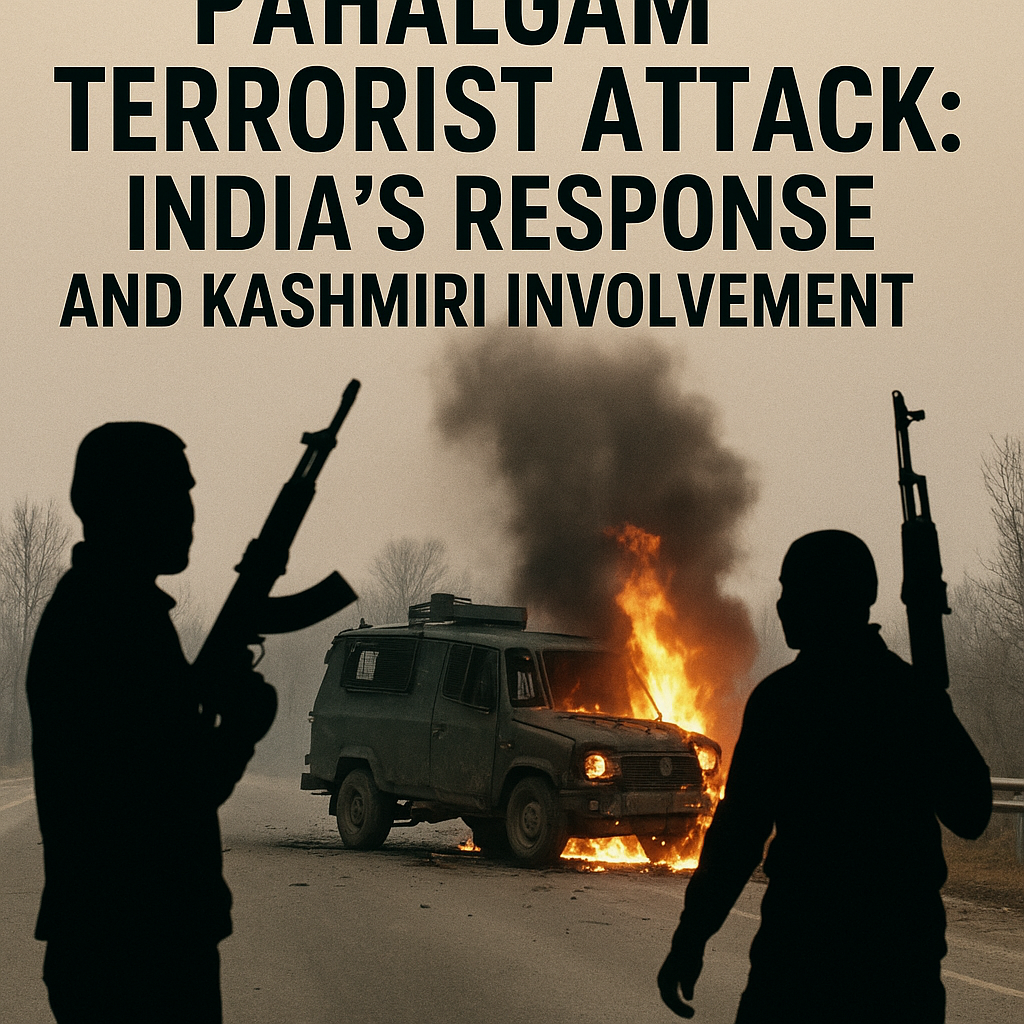Pahalgam Terrorist Attack: India's Next Move Against Pakistan and the Role of Local Kashmiris

Introduction
The serene valleys of Pahalgam, a popular tourist destination in Kashmir, were rocked recently by a brutal terrorist attack. The assault left several security personnel and civilians dead or injured, once again pushing the issue of cross-border terrorism to the forefront. As investigations unfold, questions arise: What action will India take against Pakistan, which it accuses of supporting terrorism? Were local Kashmiris involved in this attack? And what does this mean for the fragile stability in Kashmir?
This article explores these critical questions in detail, examining the strategic, political, and social ramifications of the latest bloodshed.
The Attack: What Happened in Pahalgam?
According to official sources, heavily armed terrorists ambushed a convoy of security forces near Pahalgam. The attack was sudden, well-coordinated, and displayed a level of sophistication indicating thorough planning. Eyewitnesses reported intense gunfire, leading to widespread panic.
Initial investigations suggest that the attackers had prior knowledge of troop movements. Intelligence inputs hint at the involvement of Pakistan-based terror groups such as Lashkar-e-Taiba (LeT) and Jaish-e-Mohammed (JeM). The nature of the assault fits the pattern often seen in previous attacks attributed to these organizations.
Indian Government's Response: Immediate Measures
In the immediate aftermath, the Indian government has ramped up security across Jammu and Kashmir. High-level meetings chaired by the Prime Minister and Home Minister were convened. Key steps include:
Increased Counter-Terror Operations: Security forces launched search operations in nearby areas to nab the perpetrators.
Tightening Border Security: Troop deployments along the Line of Control (LoC) have intensified.
Diplomatic Offensive: India has engaged the international community, presenting evidence of Pakistan's alleged support for terrorism.
However, these measures are only the beginning. Strategic retaliation is on the table, and history suggests India may not shy away from bold moves.
Possible Actions Against Pakistan
India's options range from diplomatic isolation to direct military action. Potential strategies include:
1. Diplomatic Isolation
India could rally global support to blacklist Pakistan as a "state sponsor of terrorism." Previous efforts at the Financial Action Task Force (FATF) saw Pakistan grey-listed; further diplomatic pressure could move it towards blacklisting.
2. Precision Strikes
After the Pulwama attack in 2019, India carried out airstrikes in Balakot. A similar approach cannot be ruled out. Surgical strikes targeting terror camps in Pakistan-occupied Kashmir (PoK) are a real possibility.
3. Economic Measures
Restricting trade ties, blocking water under the Indus Water Treaty, and imposing other economic penalties are tools India can leverage.
4. Cyber Operations
In an era of hybrid warfare, India might launch covert cyber operations aimed at crippling terror communication networks and creating instability within Pakistan.
Local Kashmiri Involvement: A Complex Reality
One disturbing trend emerging from preliminary investigations is the possible involvement of local Kashmiris. While Pakistan provides logistical and financial support, the ground operatives often include radicalized youth from Kashmir.
Factors Behind Local Recruitment
Radicalization: Extremist ideology continues to find fertile ground in parts of Kashmir due to online propaganda and local grievances.
Economic Despair: Lack of job opportunities drives many young people towards militancy.
Political Disillusionment: The abrogation of Article 370, seen by many Kashmiris as a betrayal, has fueled resentment.
Yet, it would be simplistic to paint all Kashmiris with the same brush. Many locals have actively cooperated with security forces, helping to thwart numerous attacks. The situation remains complex and highly localized.
Broader Implications for Kashmir's Security
The Pahalgam attack underlines the fragile security environment in Kashmir. Several implications arise:
1. Increased Militarization
The government may deploy additional forces, leading to further militarization of the region, possibly escalating tensions with the local population.
2. Tourism Impact
Pahalgam, being a tourist hub, will likely see a sharp decline in visitors, affecting the local economy.
3. Political Fallout
Pressure will mount on the Indian government to demonstrate a strong response, which could lead to tougher laws and greater restrictions in Kashmir.
4. Human Rights Concerns
Intensified counter-terror operations may lead to human rights violations, drawing criticism from domestic and international organizations.
The Road Ahead: What Needs to be Done
To address both the immediate and root causes of terrorism in Kashmir, India needs a multi-pronged strategy.
Strengthening Intelligence Networks
Robust, ground-level intelligence gathering is crucial to preempt attacks.
Counter-Radicalization Programs
Community outreach, educational reforms, and counter-narratives to extremist propaganda are essential.
Development Initiatives
Massive investments in infrastructure, education, and job creation can undercut the appeal of militancy.
International Cooperation
Partnering with nations facing similar threats (like Israel, France, and the U.S.) can help India refine its counter-terror strategies.
Conclusion
The Pahalgam terrorist attack is a grim reminder that the Kashmir issue remains far from resolved. While Pakistan's role in fomenting terrorism is undeniable, the local dynamics within Kashmir require careful handling. India must strike a balance between strong counter-terrorism measures and winning the hearts and minds of Kashmiris.
The coming weeks will be critical. The world will watch how India responds—whether it opts for measured retaliation or a dramatic show of force. Either way, the stakes are high, not just for Kashmir but for the entire South Asian region.
.jpg)